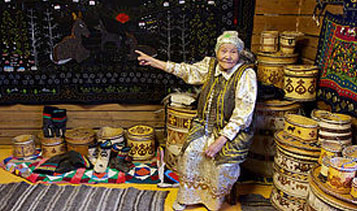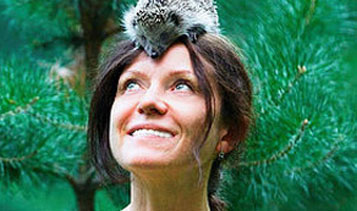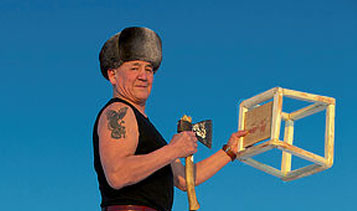June 10, 2015 | Galya Morrell
Last week I was invited – along with African American conservationist and planetwalker John Francis and British award winning Church historian Diarmaid MacCulloch – to The BBC Forum, ideas discussion programme, to talk about Silence.
At first I was sort of dumbfounded. Isn’t it a bit hypocritical – to talk about silence at all? Shouldn’t we just stay silent for a bit instead of speaking – to show others the way? To say the truth, this is exactly what I thought when I got a call from this radioshow that reaches 180 million worldwide each week.
It turned out that my fellow guest speakers – John and Diarmaid (and now I can say – both great human beings) were world experts in Silence. John Francis walked across America for 22 years, 17 of them in total silence. Diarmaid MacCulloch knows everything about Silence in Christian tradition and practice. They are really passionate about this matter. And so was Bridget Kendall, the host. And the questions we were supposed to discuss were: can we really communicate without words? Can silence be used to control other people? Is there “negative” silence and “positive” silence? And finally, when and where did we personally ever got closest to absolute, true silence?
In the West silence is often seen as the absence of thought, as a sign of intellectual backwardness, or absolute indifference. But in the North where I come from it is different. Ultimate cold creates silence. Let’s say, When it is minus 50 or 60 C on the Pole of Cold in Oymyakon, it appears that your mind and body stop working. But they don’t. Our body and mind adapt and discover inner resources that have been hidden before and not even known to us.
Deep-frozen, language changes too. It becomes so compressed. Every word has so many layers, many meanings. And intonations mean more than a word itself.
When you are in the Great Cold and you have no one to talk to, you suddenly realize that all our basic instincts that helped our ancestors to hear things and see things hidden behind the horizon or behind the Time itself (for example, to forecast the weather to the extent that contemporary meteorologists still can’t) suddenly come back. It means that the ancient knowledge is not lost forever. You just need to take a break from talking – and all these magical things will return.
In the North, very often – even when we are together – we don’t say anything. Bot because we don’t want, but because we do not need to say anything. And the fact that we are not saying anything does not mean that we are not communicating. Or you can say that we are communicating by silence.
In other words, We don’t need words to convey a message
Silence is OK in the Arctic. In the West you fill silence with small talk – but in the Arctic you don’t. Because even in so called “absolute silence” you are still communicating – without using words. You hear each other’s breath, sometimes even heartbeat – it’s an inner language, the finest instrument of communication – which is much bigger than simple body language. Compared to your heart beat, word is the least perfect instrument of communication.
In the West, silence can be interpreted as almost embarrassing – but not in the North. HUnters in Komi Land don’t speak too much. Animals can hear everything – from far far away. One may call animals “wordless”. Yet, they have a fascinating ability to instantly scan us – they know the truth! We are transparent to them.
My ancestors are of Komi descent. They were nomads – caribou herders, people who spend a lot of time in silence, or what it may look like silence to most people from big cities and advanced cyvilisations.
The homeland of my ancestors is taiga, tundra, and peat bogs. Silence there was not self-imposed for any political or philosophical reason, it was just an instrument of survival.
People did not talk about silence. It was assumed that you don’t talk, because otherwise you will have little chance to survive.
I was a quite a silent girl when I started schooling and a lot of kids ridiculed me. They called me a retard, a swamp toad. Adults called me shy. I don’t think I was really shy – I was just not talkative. As a very young girl I spent much time wandering around the swamps collecting berries and exploring life. Swamps are some of the most enigmatic places I know on Earth and some of the silent ones.
Swamps are treacherous. Journeys in peat bogs require concentration and listening. One misstep and you are sucked by the peat bog. You are sort of gliding on the surface – you make the second step before you finished making the first one And of course, you do it in silence.
Why to talk? We talk to impress. We make so many unnecessary noise. If you a hunter or a fishermen you don’t really talk to much. You listen. If you talk too much or just a little, you yourself become an easy target.
And then of course in the old days there was Taboo. You did not say certain things in order not to disturb our gods.They had to be respected. But not only they! In Northern culture everything got life: Stone, iceberg, fire and a little fly. And they all have to be respected. And when you talk too much you don’t show respect.
When I first travelled to Europe and then to the US I was astonished to find out how much people talk there. Small talk. Because even a single moment of silence is perceived as disturbing and even aggressive. And they talk they mostly talk about themselves.
But long before that – when I started travelling up North as Arctic correspondent of the Soviet newspaper Pravda – I learned about another kind of silence – the one of drifting ice. I learned that there is even greater Silence than the one I knew in the tundra. I would often travel to Archipelago Northern Land – located between two seas, Kara and Laptev, to the North of Taymir peninsula. By the way, Northern Land, or Severnaya Zemlya was the last archipalago on Earth to be discovered ( in 1913 )and it was uninhabited by humans except for an Arctic base.
I would often walk to Ostrov Domashni (Home Island) on ice from Ostrov Sredny (Middle Island). There was a tomb of a great Russian polar explorer Georgy Ushakov. I would walk in total silence. I called these trips “Silent Expeditions”. Later on I told about these expeditions to the son and grandson of Ushakov who happen to be my very close friends.
Northern Land (Severnaya Zemlya) was the place where I started my life an an “ice artist”.
I grew up on fairy-tales of the North, in which humans easily turned into animals and vice versa. They intermarried and their off-spring had superpowers. Most of these stories would be considered absolutely politically incorrect in the West. There were also half-humans, wondering hermits, who travelled across the tundra, who knew how to fly underneath the ice.
One had to suffer, to go through hunger, to live with no cloths for a long time, to sruvive before becoming such a creature. I was always fascinated with them. When I was in school and then later in college I was involved in theatre and was making my own plays about these creatures, but the wooden stage was just not enough for me.
So, when I came the ice desert of Northern Land, I immedtealy understood that this was my stage – the ideal one. Here you can see hundred of miles in each direction. And there is absolute silence.
You may ask – what kind of stage that would be – without an audience? Well, of course, there were hardly any people around. So, at times I was performing for my own self. Sometimes – for snow foxes. But often – for people who worked at polar drifting stations – scientists and others who for many long months stayed in the Far North.
I would come out on the drifting sea ice and dance in silence. No music, no words. I had very little cloths – a simple dress which I would make of all kinds of local materials – fishermen nets, arctic hare., bird and fish skins. I would dance bare foot.
Silence and sounds of the High Arctic were the music of my performances. There is no real silence here. Arctic silence consists of barking of a seal, cracking of ice, howling of a wolf, the sniffing of a snow fox, growling of a bear, breathing of the whale, nightly chorus of the dogs, thunder-cap of a collapsing iceberg, yelling of the dog-driver, a cosmic silence of the dancing Northern Lights…
And think of little auks that fly from South Pole to North Pole and back – incredible creatures. When they fly above your head the sky turns black. Their wings are so small that they have to flap them thousands of times to keep moving producing so much noise that goes into all your pores. Millions of auks.
Last summer we went in a small open boat equipped the laconic hunter’s style to the world’s northernmost settlements in Avanersuaq (Thule Land) in Northern Greenland. The name of our expedition was Avannaa – which means North in Kalaalissut.
The Inughuit, in former times known as “proud Polar Eskimos”, is one of the smallest indigenous groups in the world, with a population of less than 800. Some of them are descendants of polar explorers Robert Peary and Matthew Henson. They succeeded to avoid the ego of “consumer civilization” and to maintain the immaterial way of life. They still use kayaks and harpoons to hunt narwhal in the summer and dog-sleds in the winter to hunt seals, walruses and polar bears.
They are experts in Silence and they are experts in adaptation. Now drifting ice on which they live, literally melts under their feet, their future is in danger, and yet they don’t talk to much about climate change – unlike people in the west. They try to adapt. Because if they don’t adapt they will die out. They don’t make battles. They don’t make accusations. They are rarely complainers. They try to adapt in silence.
On our way we were able to approach so many animals – so close. Many people who came to my photo exhibition “The Stolen Moments” were amazed to see the picture of a family of three seals – mother, father and a baby who let us literally land on the iceberg where they were sunbathing. And indeed, they are such shy and easily intimidated beings, that normally they would not let anyone close by. But since we spent so much time on sea, we smelt like intestines, and we did not talk – they let us be guests in their home.
And of course, you are not the same person after such an encounter.
But Arctic is not silent anymore. With the arrival of big multinational companies searching for oil, gas and rare earth minerals, the Arctic has become really loud. But this will be the next chapter on my blog…
Tags

My blogs:




Travels with the Nomad:
October 31, 2015 | Galya Morrell
Matters of Health:
June 10, 2015 | Galya Morrell
Russian Telegraph:
May 1, 2015 | Galya Morrell
Travels with the Nomad:
October 31, 2015 | Galya Morrell
Matters of Health:
June 10, 2015 | Galya Morrell
Russian Telegraph:
May 1, 2015 | Galya Morrell






